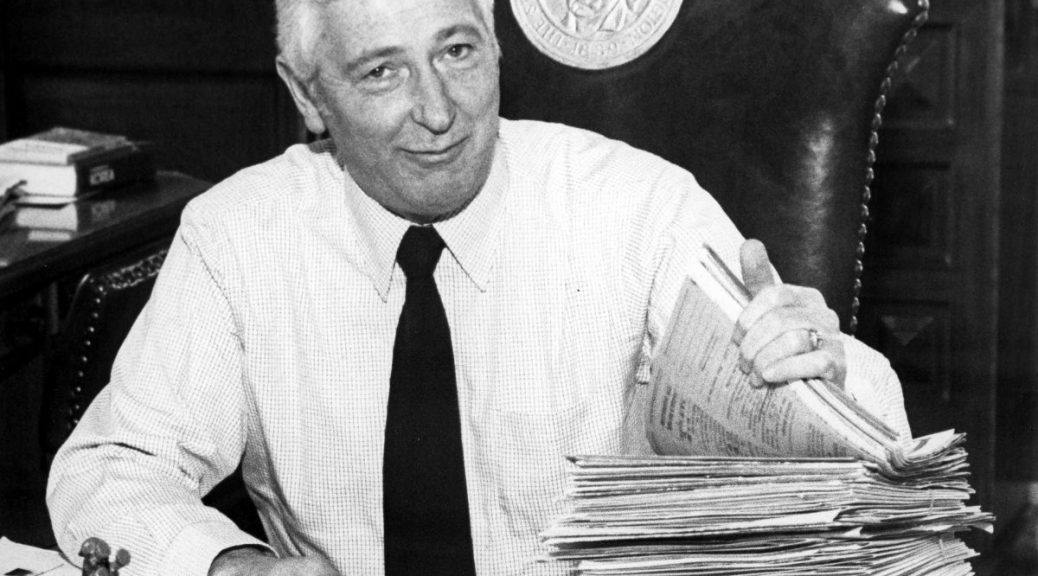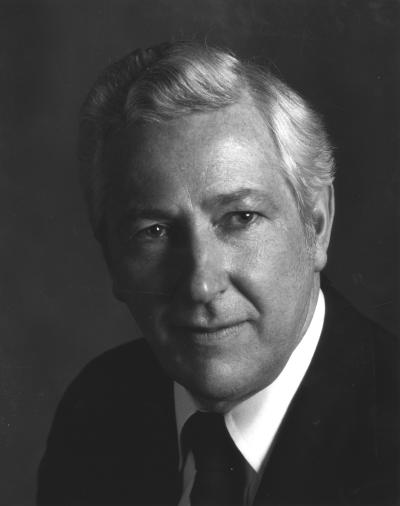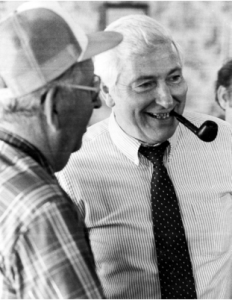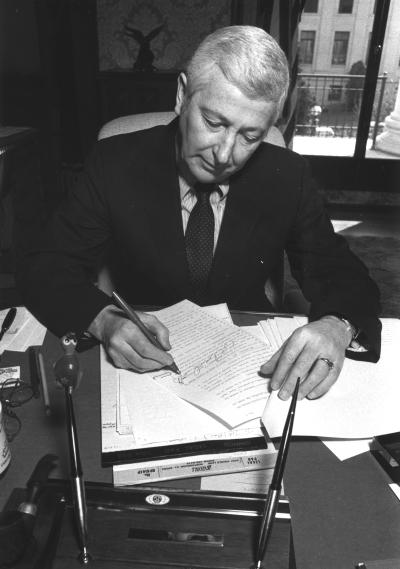
Remembering Governor Spellman
The Jan. 16 death of former Gov. John D. Spellman at 91 prompted personal reminiscences from several staffers in the Office of the Secretary of State who knew Spellman during and after his 1981-85 time in state office.
State Archivist Steve Excell, who served as Gov. Spellman’s chief of staff, said in a television interview with KING-5 that Spellman had changed his life, as well as those of countless Washingtonians.
“He was a true statesman,” Excell said. “He was a visionary leader.” 
Excell described Spellman, who was the state’s most recent Republican governor, as a committed coalition-builder who valued public service above partisan agendas.
“He was a courageous leader, but he was also a very collegial person to work with. He was not a bitter partisan. He always welcomed working on both sides of the political aisle. He didn’t care what your politics were. If you wanted better schools, better roads, better parks, you could work with him.”
Spellman, a lawyer by training, served as King County’s first county executive from 1969-80, during which he led efforts to build the Kingdome and new county parks. As governor, Spellman’s proudest achievement was stopping a push to build an oil pipeline beneath Puget Sound, which was supported by President Ronald Reagan and labor unions alike.
“Back in those days, environmentalism and ecology were brand-new words,” Excell said. “But he saved King County parklands before he left as county executive. He came down as governor and vetoed some major projects that would have put Puget Sound at risk, including an oil pipeline under Puget Sound.”
OSOS Facilities Manager Patrick McDonald, who worked on Spellman’s staff as a legislative assistant, recalled bonding with Spellman over their shared Catholic background and mutual acquaintances at St. Martin’s College, where McDonald was a student when he first joined the governor’s office.
McDonald said Spellman “came from an older school of governors” who worked with a close-knit circle of senior advisors. McDonald’s duties for Spellman ranged among a variety of official tasks, from playing piano during Governor’s receptions to representing the office during a Papal visit to British Columbia.
“Talking to him was like talking to my dad,” McDonald said of Spellman.

Chief Historian John Hughes, who wrote a biography of Spellman in 2013 titled Politics Never Broke His Heart, said the job had taught him much about the late governor’s outsized legacy.
“As I started digging deeper, I quickly realized that Spellman’s life story is also the story of King County’s bumpy road to maturity, if that’s the right word,” Hughes said. “And many of the issues Spellman faced as governor—notably the ‘paramount’ duty to fund public schools and our regressive tax structure—remain with us today. John Spellman was a paradoxical politician, yet a renaissance man with a compelling life story that included heartbreak, courage, missteps and other cautionary tales. He deserves to be so much more than a quick obituary footnote as ‘Washington’s last Republican governor.’ ”
Hughes described Spellman as “a uniquely American admixture”: a descendant of Irish and Puritan immigrants who could trace his lineage to the Mayflower and potato famine refugees. Born in Seattle in 1926, Spellman was a maritime and labor lawyer before he entered politics as a King County commissioner in 1966. He won the newly-created county executive job as a reformer four years later and, in that job and as governor, stood for good-government principles and bipartisan cooperation.
Hughes wrote:
“If timing is everything, Spellman’s was bad. When he sang “When Irish Eyes are Smiling” at his inauguration in 1981, it dispelled the frowns for about 24 hours.

“He took office during the worst economic downturn the state had seen since the Great Depression of the 1930s—a recession since surpassed only by the travails that began in 2008. Spellman’s decision to break a no-new-taxes pledge, coupled with internecine warfare that fractured both political parties, crippled his bid for a second term even though the economy was on the rebound.
“His father had warned him early on that politics would break his heart, but Spellman was philosophical: ‘Politics is politics,’ he told Hughes during their last oral history interview. ‘Sometimes it’s the best salesman who wins, but I have no regrets. I’m proud of what I did as governor. I did a lot before that too. I’ve never stopped trying to contribute.’”
Spellman is survived by his wife, Lois, six children and six grandchildren. In a statement, Spellman’s family members asked Washingtonians to “hoist a Guinness for strength” in memory of the proudly Irish former governor.